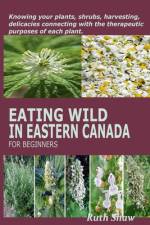- Knowing your plants, shrubs, harvesting, delicacies connecting with the therapeutic purposes of each plant.
av Ruth Shaw
157
Wild berries, nuts, leaves, and roots are all part of this beginner's introduction to Canada's edible flora. Stunning images accompany the identification of numerous common species and the provision of preparation directions for their edible components in this book. The section on poisonous plants that can produce blisters on the skin when touched is also included. In addition to being a visually appealing and potentially cost-effective source of flavor and nutrition, wild plants are a great complement to any diet. For anyone new to foraging or interested in learning how to cook with wild plants, Edible Wild Plants for Beginners is an excellent resource. Learn about popular edible wild plants, as well as potentially dangerous species that look similar, when to harvest them, where to find them, and how to grow with the help of Edible Wild Plants for Beginners. Anyone seeking to broaden their culinary horizons will find the ideal resource in Edible Wild Plants for Beginners, which contains more than 95 recipes and drink ideas. Vegetables, nuts, mushrooms, and fruits that grow wild in urban parks, rural regions, and along highways can be eaten. The natural world provides a wealth of low-cost, high-quality food options, such as a wide variety of mushrooms, herbs, and expensive leafy greens. You need to know when to harvest them, how to recognize them, how to cook them, and when to eat them if you want to enjoy them. Prior to collection, it is essential to know which wild plants are edible and which are poisonous.


